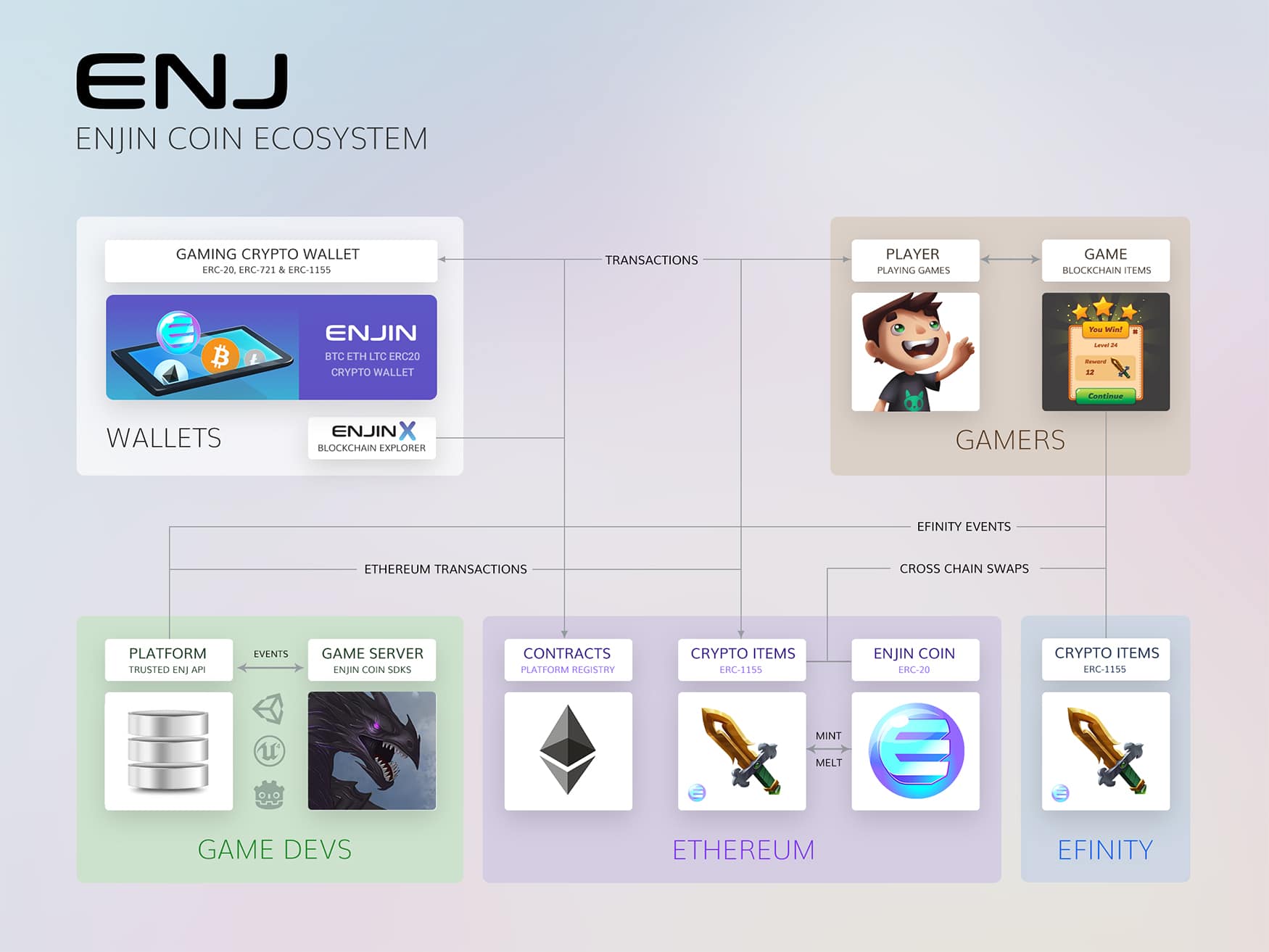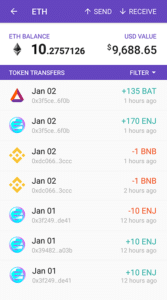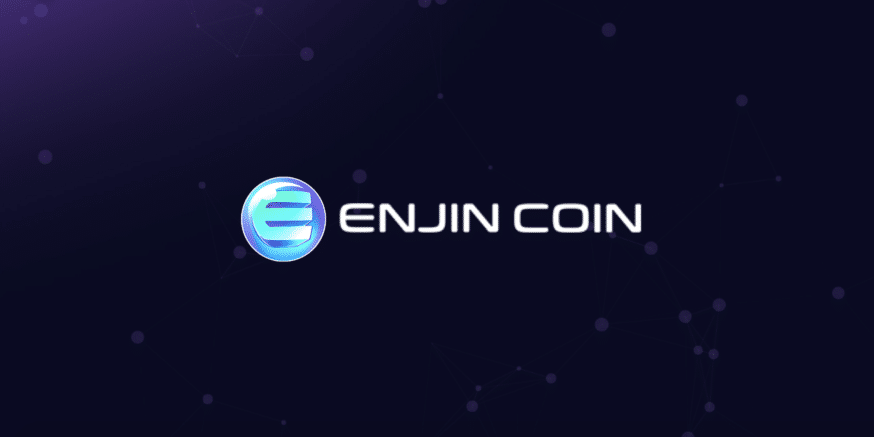What Is Enjin Coin?
Enjin Coin is a cryptocurrency for virtual goods created by Enjin. Enjin is the “largest gaming community platform online” with over 250,000 gaming communities and 18.7 million registered gamers.
The Enjin team is designing the coin completely around gaming with the goal of it being the most usable cryptocurrency for the industry. The project includes the Enjin Coin as well as a suite of software development kits (SDKs) that developers can integrate into their games and communities. Bringing blockchain to gaming helps to reduce the high fees and fraud that’s prevalent in the transfer of virtual goods.
In this Enjin Coin guide, we’re going to cover:
- How Does Enjin Coin Work?
- Enjin Coin Team & Progress
- Trading
- Where to Buy ENJ
- Where to Store ENJ
- Conclusion
- Additional Enjin Coin Resources
How Does Enjin Coin Work?
Enjin Coin is an ERC20 token built on the Ethereum network. With that, the project not only acts as a cryptocurrency but also has smart contract capabilities. It’s also one of the first projects testing the Raiden Network, Ethereum’s version of the Lightning Network.
The Enjin Coin platform provides a laundry list of features through its public API and SDKs. To keep things brief, though, we’ll only be discussing a few of the major ones in this article.
Virtual Goods
The largest value Enjin Coin brings to the gaming community is in its creation and management of virtual goods. Developers on each platform can easily create a currency unique to their community that’s backed by Enjin Coin as the parent currency. This gives the coins all the benefits of the blockchain (speed, cost, security, etc…) while still staying customized to their respective platforms.
Because each asset is recorded on a single Registry smart contract, all Enjin Smart Wallets recognize them. And, you can exchange virtual goods for Enjin Coins at any time. This creates an interconnected ecosystem of games and communities in which you can even transfer assets across platforms (more on this below).
Beyond currencies, this functionality also applies to privilege tokens as well as unique game items like swords or attack attributes.

Payment Gateway
Additionally, the Enjin Coin SDK includes a decentralized payment gateway. The gateway is robust, allowing you to create customized carts, invoices, refunds, etc., on top of it. It also provides a widget to accept Enjin Coin and/or Customized Coin payments on your website.
The payment gateway only charges a small fee in Ethereum on each transaction – nothing additional.
Utilizing functionality from the Smart Wallet, you, as a user, can set up automatic payments to games and websites that you list as a Trusted Platform. This adds faster and more trustworthy payments to normal subscription services.

Smart Wallet
The Enjin Smart Wallet is the component that connects everything together. The wallet supports the virtual goods from every one of your Trusted Platforms and is synced to your Ethereum address.
You’re able to trade coins and items outside of the gaming environment to any other user with a Smart Wallet. Through the wallet, you send transactions via a Transaction Request that the other party can either approve or deny. On top of that, you can also set rules and thresholds to automatically prevent undesired transactions.
Efinity
At the start of 2018, the Enjin Coin team announced plans for Efinity, a channel network solution to help Enjin scale more effectively. Efinity, like Bitcoin’s Lightning Network, consists of numerous game channels in which a game can perform a near infinite amount of transactions quickly and with almost zero cost.
Other Features
Beyond these three features, Enjin Coin also includes virtual goods stores, subscription services, trading escrows, and “top lists” for items, servers, teams, and/or games.
Enjin Coin (ENJ) Supply
There’s a total supply of 1 billion Enjin Coins (ENJ) with just over 760 million currently in circulation. The team distributed 80 percent of ENJ to crowdsale participants and split the remaining tokens between themselves, advisors, and incentive programs.
When users create custom assets, the corresponding value in ENJ is removed from the ecosystem decreasing the circulating supply. This, in turn, should increase the value of individual ENJ tokens.
Enjin Coin Team & Progress
Enjin, the company behind Enjin Coin, is the largest online gaming community creation platform. Started in 2009, the company receives 60 million views per month and transacts millions of U.S. dollars each month in their community stores. The team is deploying Enjin Coin across the entire Enjin CMS platform – over 250,000 gaming websites.
Advisors to the project consist of Anthony Diiorio (Ethereum co-founder) and Pat LaBine (previous producer and technical director at Bioware). Enjin has also formed partnerships with Unity, PC Gamer, and NRG eSports.
[thrive_leads id=’5219′]
The team held a successful ICO in late 2017 in which they raised ~$35 million between the private and public rounds. Although it’s still a relatively young project, the team spent the last quarter of 2017 building the Platform API, Mobile Smart Wallet, and a Java SDK alongside creating a Minecraft plugin. They were busy in 2018 as well, creating various platform plugins, Efinitiy, numerous other SDKs, and the EnjinX blockchain explorer.
No project has dominated this market yet. Enjin Coin’s largest competitors are GameCredits and WAX, but there are significant differences between them. According to Enjin CMO Elija Rolovic, Enjin Coin is the “Ethereum of Gaming” while the competitors are just simply “tokenizing their centralized games/marketplaces.”
The Enjin team hasn’t published a 2019 roadmap yet.
Trading
Enjin Coin has had a fairly predictable trading run since its launch in November 2017. It followed the market with a huge run up in December and early January 2018 before falling throughout 2018 to its current price of about ~$0.038 (~0.0000096 BTC). The ENJ price saw a few convergent spikes in mid to late January as well as February and April, but these don’t seem to be related to any news in particular. We can probably chalk up these movements to overall market trends.
In a more bullish market, additional partnership announcements and product releases may lead to an increase in the price. And, of course, more people using Enjin Coin in online gaming should positively affect the price as well.
Where to Buy ENJ
You can purchase ENJ with BTC and ETH on Binance. It’s also traded on Liqui and Kucoin but with much less volume.
If you don’t own any Bitcoin or Ethereum, you should first buy some with U.S. dollars on a platform like GDAX (now Coinbase Pro).
Where to Store ENJ
Because it’s an ERC20 token, you have plenty of options on where to store ENJ. A popular online option is MyEtherWallet while the Ledger Nano S is a solid choice for a hardware wallet.
Ideally, though, you should use the official Enjin Wallet. It’s available for Android and iOS mobile devices. Other than ENJ, you’re also able to store BTC, ETH, LTC, as well as all ERC20, ERC721, and ERC1155 tokens in the wallet. The team will continue to add support for other altcoins too.
Conclusion
Enjin Coin is adding the benefits of blockchain to the over $17 billion virtual goods market. The team is working to prevent fraud in the gaming industry and provide true ownership to virtual goods holders. Created and backed by gaming giant Enjin, the project has a solid foundation of support.
However, Enjin still has much to prove. It’s impossible to predict how successful it will be, but if it’s current achievements and team are any indicator, Enjin Coin could have a bright future ahead.
Editor’s Note: This article was updated by Steven Buchko on 1.7.2019 to reflect the recent changes of the project. This article was updated by Alex Moskov on 5.5.2020 to update links.







